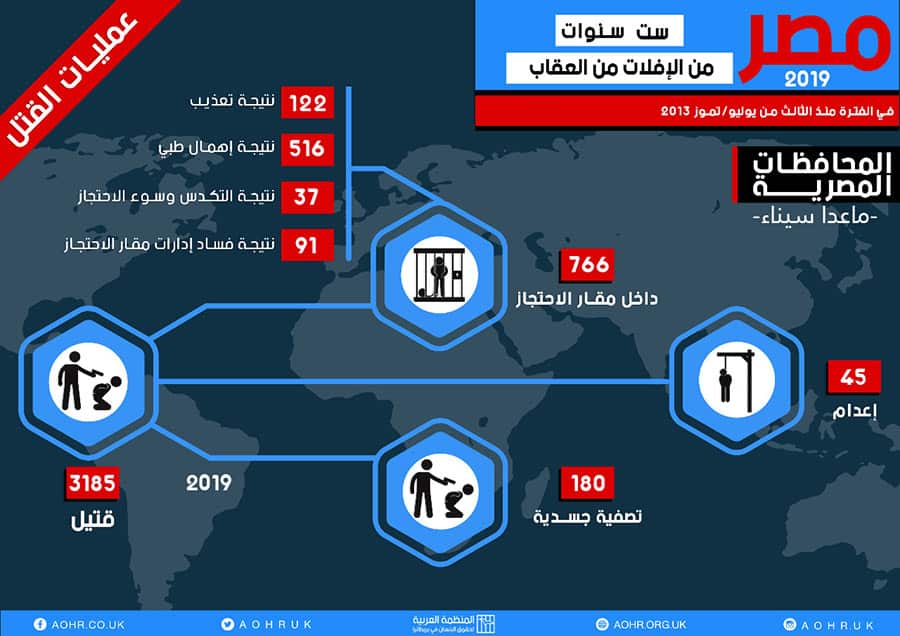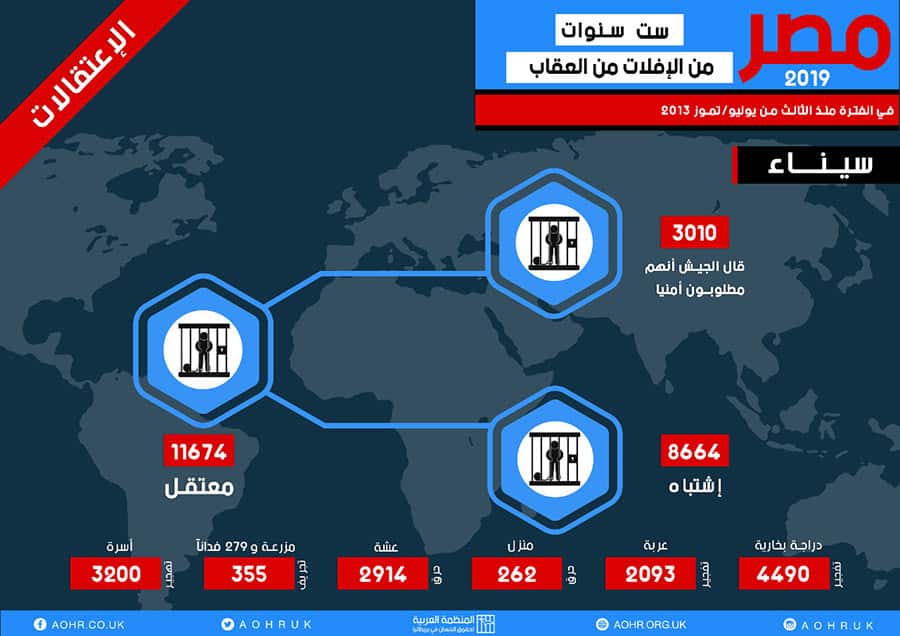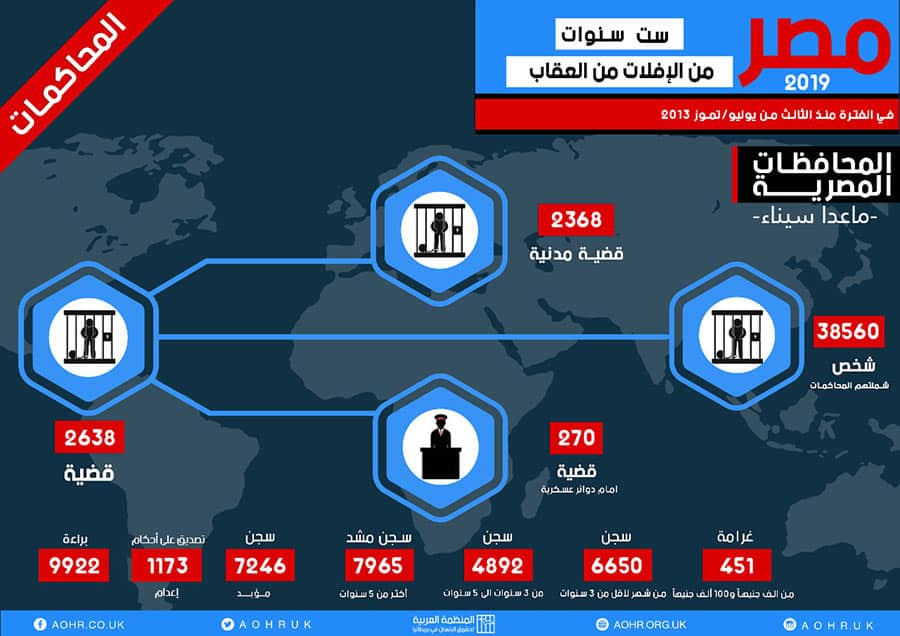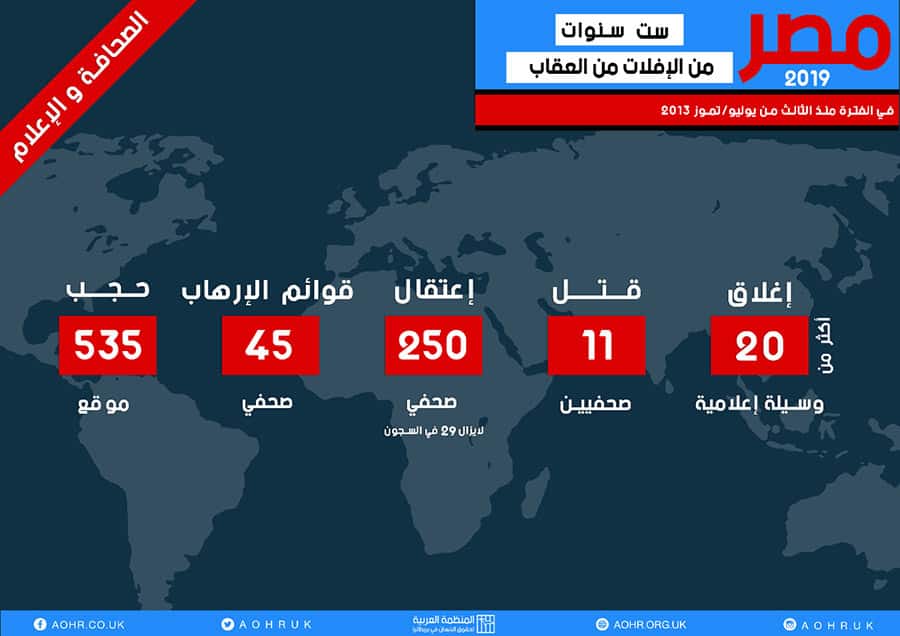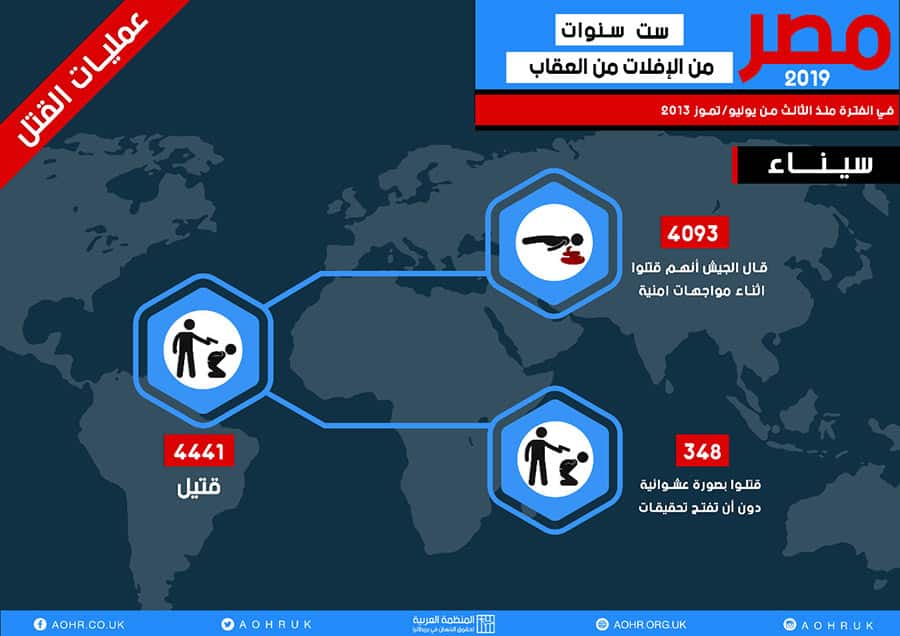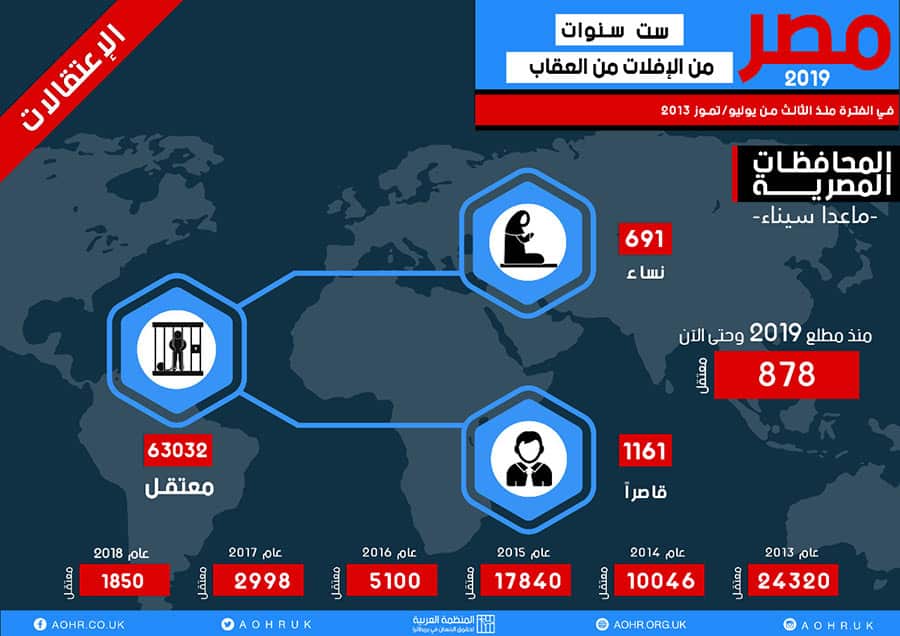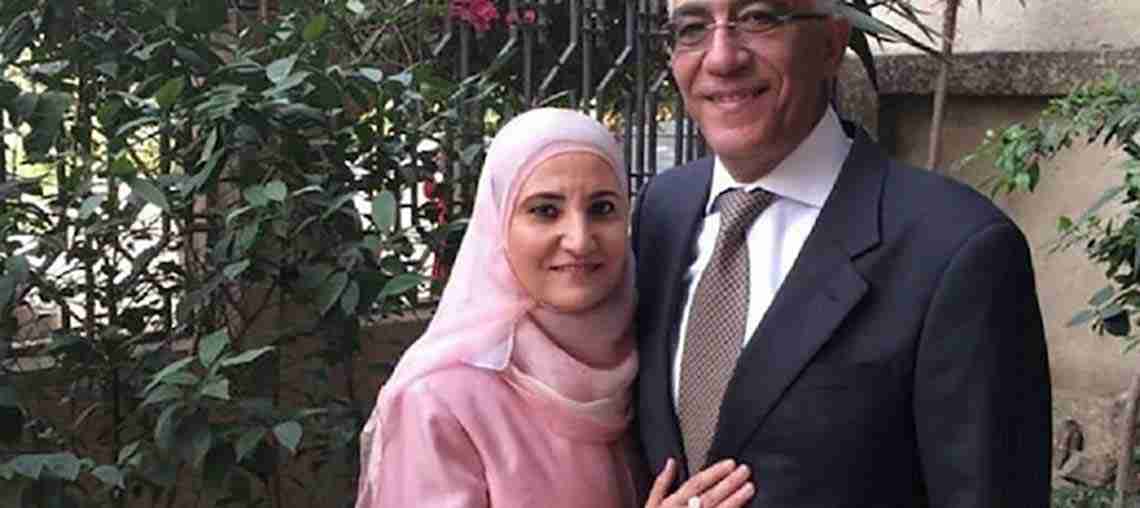In all Egyptian governorates except Sinai:
3,185 Egyptians were killed, of whom 2,194 were killed in peaceful protests and gatherings.
766 people were killed in detention centres, including 516 detainees who died as a result of medical negligence.
180 people were killed by direct extrajudicial killing.
1,173 were sentenced to death and 7,246 were sentenced to life imprisonment.
In Sinai:
4,441 citizens were killed; 11,674 arrested; 262 houses, 2,914 huts, 4,490 motorcycles and 2,093 vehicles were set on fire and destroyed.
3,101 houses were demolished in the Rafah border area, with the displacement of more than 3,000 families.
Arab Organisation for Human Rights in the UK (AOHR UK) said that in the six years since July 3, 2013 in Egypt, the human rights situation has been continually declining in an unprecedented manner. Security forces have practiced all forms of violations under the climate of complete impunity.
AOHR UK added that during this period, security services have extra-judicially killed 3,185 people. These deaths have occurred across all Egyptian governorates except Sinai, which will be mentioned separately. Among the dead, 2,194 were killed as a result of security attacks on peaceful gatherings, most notably the Rabaa and Nahda sit-ins on August 14, 2013; 766 persons were killed in various detention centres, including 122 persons who died under torture, 516 due to medical negligence, 37 as a result of overcrowding and poor detention conditions, and 91 as a result of the corruption of the prison administration.
AOHR UK reported that on June 17, 2019, the death of former President Mohamed Morsi was announced after he fell unconscious during a court session of his trial, but several questions were raised about Morsi’s sudden death in court. Was his death due to medical negligence? Indeed, over the six years of his detention, the regime deliberately refused to provide him with necessary treatment for the several chronic diseases he suffered with. Or was he killed by some kind of poisoning? Morsi had mentioned in one of his trial sessions that he was exposed to threats that may affect his life. Despite these questions, Egyptian authorities forced his family to bury him hastily without allowing the family to request a medical autopsy.
AOHR UK emphasised that over the past six years, the Egyptian regime has used extensive arbitrary arrests to suppress opposition and to abolish any potential for freedoms of opinion and expression. According to quantitative monitoring of arbitrary arrests in Egypt, there is an estimated figure of 63,032 people who have been arbitrarily detained since July 3, including 691 women and 1,161 minors.
As per usual with the Egyptian security authorities, most detainees were subjected to enforced disappearance for varying periods of time. According to complaints received by AOHR UK, the families of those forcibly disappeared sent many telegrams and communications to the Attorney General and the Minister of Interior demanding that the fate of their relatives be revealed, but the Public Prosecution, in its capacity as the entity responsible for initiating criminal proceedings, refrained from opening any investigation into any such communications.
AOHR UK asserted that in order to blur the truth, the Egyptian regime targeted journalists and various media outlets continuously since July 3, 2013, closing down more than 20 media channels and newspapers, and prohibiting many journalists and writers from writing and publishing. A number of journalists were also deported. The Journalists Syndicate was broken into and two journalists who had taken refuge in it were kidnapped, and the Chairman of the Syndicate had fabricated charges imposed against him. Over the course of the six years, 11 journalists were killed and more than 250 were arrested, of whom 29 journalists remain in detention. Furthermore, more than 45 journalists have been placed on the terrorism lists, and the Egyptian regime has blocked 535 news websites and newspapers.
AOHR UK monitored the hearings of the trials of detainees held in cases related to opposing the authorities since July 3, 2013 until now. Sentences were handed down in 2,638 politically-affiliated cases related to opposition of the regime. Verdicts were handed down in civil and military courts, with 2,368 verdicts in civil cases and 270 verdicts in military cases.
The sentences handed down on the convicts were as follows: 7,246 people were sentenced to life imprisonment (26% of the total convictions); 7,965 were sentenced to more than five years and up to 15 years imprisonment (28% of the total convictions); 4,892 were sentenced from three to five years imprisonment (17% of the total convictions); 6,650 were sentenced to imprisonment from one month up to 3 years (23% of the total convictions); 451 were fined amounts ranging between 1000 and 100,000 EGP (2% of the total convictions). Additionally, 1,173 had their death sentences ratified (4% of the total convictions). Total convictions since July 3, 2013 amount to 28,377.
AOHR UK elaborated on the death sentences in Egypt, where the Egyptian civil and military judiciary transferred the papers of 2,261 defendants to the Mufti for ratification. Of them, 1,173 had their papers ratified and were sentenced to death in 94 different cases, of which 16 were before military circles. Of these, 128 exhausted all possible means of appeal, making the sentences final and enforceable against them. Egyptian authorities have already executed 45 defendants, and 83 are awaiting imminent execution.
AOHR UK notes also the aftermath of the security forces operations in Sinai during the monitoring period according to quantitative monitoring of all official statements issued by the Egyptian Armed Forces, as well as what has been monitored by credible activists. The number of civilians killed since July 3, 2013, in Sinai is 4,441, of whom 4,093 were those the army said were killed as a result of security confrontations, and the rest the Egyptian army admitted were killed indiscriminately.
Over the same period, the number of those detained in Sinai was 11,674, of whom 3,010 were wanted by security forces according to the spokesman of the Egyptian armed forces, while 8,664 people were arrested on suspicion.
It was also announced that 4,490 motorcycles and 2,093 vehicles were burned during the monitoring period, as well as the burning and destruction of hundreds of homes and huts of the people of Sinai. The number of houses that were burned and destroyed during the period of this report was 262 houses, and the number of huts burned and destroyed was 2,914, in addition to the destruction of 355 farms and 279 acres of land.
AOHR UK pointed out that the aforementioned houses and huts that were burned and destroyed were outside the Gaza border strip which the Egyptian government ordered its evacuation, displacing the residents from their homes and demolishing them, in preparation for establishing a buffer zone on the border with Gaza. The evacuation process entailed three phases which began in October 2014 when 3,101 houses, which housed more than 3,200 families (approximately 14,000 persons) were demolished.
AOHR UK stressed the need to take serious and decisive positions against the Egyptian regime, which is not subject to any domestic or international monitoring. The state of impunity the regime has been enjoying has reinforced its will to move forward with further crimes and violations.
AOHR UK calls on the Secretary-General of the United Nations to activate the necessary international mechanisms to restrain the Egyptian regime, stand by the victims, and hold accountable all those responsible for the crimes committed. Six years of repression, killing and detention have passed across all Egyptian lands, and the victims are still waiting for equity and justice.




















